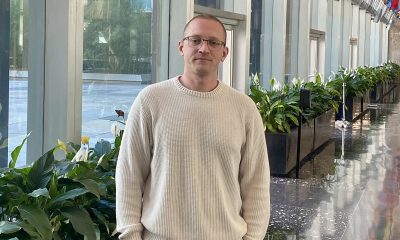a&e features
Witness to the horrors in Chechnya
New documentary reveals life-or-death struggle to escape ‘gay genocide’
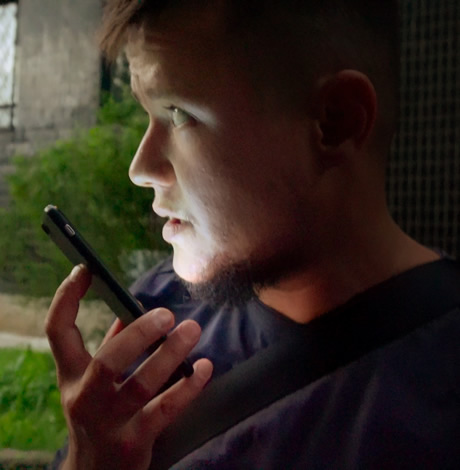
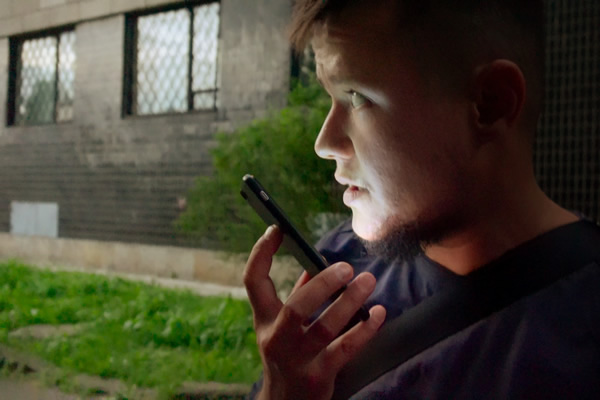
In an era when documentaries often seem geared more toward a slick and buzzy “docu-tainment” style than to the unfiltered presentation of real-world facts and experiences, “Welcome to Chechnya” blasts you in the face like a gust of icy wind.
A harrowing look at the “underground railroad” that sprung up within Russia to help the victims of the notorious “gay genocide” being perpetrated under Chechen leader Ramzan Kadyrov, it’s a film that makes you want to look away but doesn’t let you do it. It conveys the unthinkable trauma of living in a constant state of terror while making a desperate, clandestine run for your very life; more than that, it permits us to put a human face – albeit a digitally altered one – on the crisis.
Part of the film’s impact undoubtedly stems from its subject matter, but it’s at least equally due to the artistry of its director, David France. It’s not the first time he’s been behind a heavyweight LGBTQ documentary. The longtime journalist made his directing debut with “How to Survive a Plague” in 2012, documenting the early years of the AIDS epidemic with an activist’s passion in a film that won him a host of awards and nominations for several more, including an Oscar.
Now, “Chechnya,” which premiered at last year’s Sundance Festival and was released by HBO last summer, has made the shortlist for this year’s Academy Awards, raising the possibility for a second chance at taking home the coveted statue. Yet Oscar gold was not what France had on his mind when he had a conversation with the Blade about the film earlier this week. Rather, he wanted to discuss the people in the film.
France, like everyone else, had been appalled by the tales coming out of Chechnya in 2017. “We all read the stories,” he tells us now, “but it wasn’t until I read Masha Gessen’s New Yorker piece about the work that ordinary Russians were having to take upon themselves that I became really fascinated.”
He is referring to the network of LGBTQ activists that mobilized in the absence of outside help to extract refugees in daring escapes, hide them in safe houses across Russia, and work with groups around the world to get them out of the country. In “Welcome to Chechnya,” he follows a handful of these accidental heroes, as well as several of the survivors they protect, as they orchestrate and enact spycraft that would be right at home in an episode of “The Americans.” In the process, he shines a light on more than just the atrocities being committed against queer people in Chechnya. He also illuminates a level of courage that most of us have never had to muster.
“That’s what drew me in,” France says. “The fact that ordinary citizens took it upon themselves to intervene, to try and save lives, while the rest of the world was doing so little about it.”
“It’s not like they had been already doing this work,” he explains. “Olga [Baranova, one of the activists who appears in the film] was running a community center that had an annual arts fair – that’s the extent of her training for the kind of cape-wearing heroics that you see her carrying out.”
With his cameraman and producer Askold Kurov, France spent months in the underground, chronicling the efforts of the activists and the stories of the survivors under their care, and getting plenty of first-hand experience with the kind of fear under which they had willingly chosen to live, day after day. After all, getting out of Chechnya wasn’t enough to make anyone safe; Chechen authorities were willing to stop at nothing to make sure nobody had a chance to expose what was going on, up to and including tracking down, recapturing, and maybe even killing any potential witnesses – and anyone who stood in the way was putting themselves in peril, too.
“I remember going on one of the extractions,” he relates. “We were getting ready to make a run with a couple whose location had been found out. We had only a few hours to get them to the airport, and then we got word of a rumor that a group of assassins had been dispatched to prevent them from leaving the country. We had one bodyguard, with one sidearm, with us.
“That kind of unbelievable peril is what hung over, and what still hangs over, every aspect of the work these ordinary Russian activists have taken on for themselves.”
It’s also what made it a challenge to film the refugees, for whom anonymity was a matter of life or death.
“I wanted to show what they looked like,” he tells us. “The pain that they wore on their faces, the hope – and certainly the fear. And most of them wanted the world to know what had happened to them, to expose these crimes – but they also understood what it would mean for them and their families if they stood up publicly and revealed their truths. They were terrified, and here I was asking them to let me film them anyway and then figure out how to solve this problem later.”
There is still a touch of awe in his voice as he says, “Remarkably, a couple of dozen people agreed to let me do that.”
He continues, “There were people, of course, who couldn’t take that leap with me. There was one person who was nervous even about me filming other people in the shelter. These were people who had just escaped the most horrific abuse and torture, and violation from their own families. They were hiding from their brothers and their uncles, from their own fathers. That dislocation of familial love was so traumatic to everybody there that some of them were just on a very sharp edge – unable to reckon with the past, unable to find security in the present or see hope in the future. You see that in the film with one of them, who even attempts suicide. For those people, it was a difficult arrangement to have me shooting even on the other side of the shelter house. I understood that and I tried to be very respectful.”
The challenge of maintaining privacy would eventually be surmounted by new, state-of-the-art identity protection software, a high-tech touch that France – savvy storyteller that he is – was able to parlay into one of the film’s most dramatic and unexpected moments. A considerable amount of screen time in “Welcome to Chechnya” is devoted to an anonymous refugee who has escaped from his tormentors into the network, where he is reunited with his family and his boyfriend of 10 years; a turning point comes when, despite being poised for removal to another country, he chooses to go public with his story and make an official complaint to the Russian government. As he makes that decision, the false features realistically rendered over his real ones melt away before our eyes, revealing his unaltered face – and with it, his true identity. It’s a powerful effect, and it’s our official introduction to Maxim Lapunov, whose subsequent appearance before a Russian court to tell his story is captured in the movie. Unsurprisingly, his claims are dismissed, and the need to get him and his loved ones out of the country becomes even more imperative.
In talking about Lapunov, the awe returns to France’s voice. “Maxim’s moral courage is unmatched. It was really clear that his life was going to be fucked up for the foreseeable future, no matter what he did. The courage that he showed was the courage to throw his body in the way to make sure that other people don’t get treated the way that he was treated – to save people’s lives. He could have gone anywhere in the world, and just nursed his post-traumatic memories in safety, but instead he went back into the fire. That was remarkable. I watched him make those decisions, I watched him take on that risk, I watched him bring his family along on that journey and win their allegiance in these choices – these are human dramas like you see in Hollywood films that actually are taking place in the queer battle against the crimes in Russia.”
He segues into a similar expression of respect for David Isteev, another activist prominently featured in “Chechnya.”
“When you look at his face, you just get this incredible sense of high alert and of moral purpose. It makes me think of the stories we have heard from the Holocaust, of citizens who would otherwise have been untouched who reach into some deep reserve to do something. That’s him. And being in the presence of that was one of the most remarkable experiences of my life.”
If it sounds like he has bonded with his subjects, it’s because he has. Being embedded in the shelter network for such an extended period of time, he and Kurov became part of the underground themselves. “We were no longer visitors from outside,” he says. “We were experiencing what they were. I spent nights full of terror inside those safe houses, when rumors were flying about people who might have been seen, locations that might have been revealed, dangers that might have been heightened – I felt that with them. We huddled together, and, in a way, I became part of their journey.
“I do feel personally attached to those people having been through that with them. It’s something like the bond of warfare that you read about. I would do anything for David. I would do anything for Maxim and his family.”
The real emotion apparent in these professions of kinship is surely one of the reasons why the documentarian is still, more than six months after his film’s debut, eager to talk about it. The people with whom he developed these strong bonds are still very much at risk.
The biggest horrors in “Welcome to Chechnya” are only glimpsed briefly in dark and blurry videos intercepted from the web by the network, or described in the stories of torment, humiliation and brutality told by the survivors, but they cast a dark enough shadow over the imagination to make us want to believe they are safely in the past. Unfortunately, as France is quick to remind us, LGBTQ persecution in Chechnya is still very much “an ongoing humanitarian crisis.” Just last week, two refugees were kidnapped from the network by Russian authorities and returned to Chechnya, an incident that brought the situation there back into the headlines.
“These were two very young men, one of them 20, and the other 17 – not even a man,” relates France. “They had been abducted last summer in Chechnya and tortured, they barely got out alive. They were rescued and extracted by the network and were being held in a safe house while the work was being done with foreign partners to try and get them out. Now they are back in detention in Chechnya. It’s a very volatile situation.”
Yet it’s also a situation in which, perhaps ironically, he sees a hope that has been scarce for the past four years.
“The United States, in this new administration, has expressed great concern for those two kids and demanded information on their safety,” he points out. “The European Court for Human Rights has demanded access to them, and safe passage for them to get back to the safe house where they were being held.”
For him, it’s a call to action. “The Russian LGBT network is on the ground, still fighting this fight,” he says. “We can urgently throw our voices behind their efforts with regard to these two youngsters – we could save their lives. There are petitions, but that’s not enough. We know from watching these activists’ work that it’s essential, it’s extensive, and as you can imagine, it’s costly. They cannot raise money within Russia, so they’ve asked people who see the film to help them by donating. There’s a donation page on the movie site. We’ve just watched almost $200,000 move through there, in the six months since the film came out, and that money goes to the Moscow Community Center, Olga’s group that runs the shelter system, to the Russian LGBT Network that does the extractions and runs the global hotline for the crisis. And it also goes to Maxim and his legal case, which is still percolating through, and showing great progress in, the European courts.
“So, I think there’s hope, but we have to act urgently. I think what’s shocked us all, in the last few years, is how easily we can lose ground. All this progress that we’ve made over the last 30 or 40 years can be reversed in a heartbeat, and that’s what’s happened in Russia, and Russia has led the way in this dramatic reversal of queer progress, all across Europe. It’s going to take a lot of people coming together internationally to stop that, but it is possible.”
He’s a realist in his expectations, though. “We can’t hope for regime change in Chechnya or in Russia. Those are not practical, immediate goals. But we can force Ramzan Kadyrov in Chechnya to stop this. He is a puppet of Putin’s. If we make it politically untenable for Putin not to intervene there, then he will lift up the telephone and say to Kadyrov, ‘Stop it.’ That’s all that it takes. It’s that simple. We haven’t gotten there because we haven’t had the kind of global leadership that can bring collective pressure on Putin to do that. I think we’re in a place where we can now.
“Even just watching the film is an important step. The Russian government has said repeatedly that this is not happening, that there’s no evidence, even – ridiculously – that there are no queer Chechens. They say that no one has come forward, but Maxim did that, officially, and they rejected his claims. The people protected by the digital technology we deployed in the film have also spelled out their stories, so they are witnesses. And we’re all witnesses, now.”
The passion creeps back into France’s voice as he recalls, “That was my promise to the people in the network, when I said I wanted to film with them, that I was going to help make this so that everybody in the world knows what’s happening.
“Anybody who sees the film becomes a witness, and it becomes an act of resistance just to talk about what you see in it.”
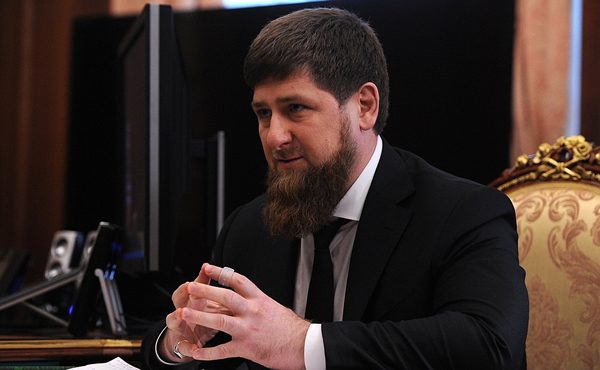
a&e features
Eastern Shore chef named James Beard Finalist
Harley Peet creates inventive food in an inclusive space

In a small Eastern Shore town filled with boutiques, galleries, and the occasional cry of waterfowl from the Chesapeake, Chef Harley Peet is most at home. In his Viennese-inflected, Maryland-sourced fine-dining destination Bas Rouge, Peet draws from his Northern Michigan upbringing, Culinary Institute of America education, and identity as a gay man, for inspiration.
And recently, Peet was named a James Beard Finalist for Best Chef: Mid-Atlantic – the first “Best Chef: Mid-Atlantic” finalist representing the Eastern Shore.
Peet, after graduation from the Culinary Institute of America, took a position as sous chef at Tilghman Island Inn, not far from Bas Rouge. Falling in love with the Eastern Shore, he continued his passion for racing sailboats, boating, gardening, and fishing, and living his somewhat pastoral life as he opened Bas Rouge in 2016 as head chef, a restaurant part of the Bluepoint Hospitality group, which runs more than a dozen concepts in and around Easton, Md.
Coming from a rural area and being gay, Peet knew he had his work cut out for him. He was always aware that the service and hospitality industry “can be down and dirty and rough.”
Now as a leader in the kitchen, he aims to “set a good example, and treat people how I want to be treated. I also want to make sure if you’re at our establishment, I’m the first to stand up and say something.”
The Bas Rouge cuisine, he says, is Contemporary European. “I’m inspired by old-world techniques of countries like Austria, Germany, and France, but I love putting a new spin on classic dishes and finding innovative ways to incorporate the bounty of local Chesapeake ingredients.”
His proudest dish: the humble-yet-elevated Wiener Schnitzel. “It is authentic to what one would expect to find in Vienna, down to the Lingonberries.” From his in-house bakery, Peet dries and grinds the housemade Kaiser-Semmel bread to use as the breadcrumbs.
Peet works to support the LGBTQ community inside and outside of the kitchen. “I love that our Bluepoint Hospitality team has created welcoming spaces where our patrons feel comfortable dining at each of our establishments. Our staff have a genuine respect for one another and work together free of judgment.”
Representing Bluepoint, Peet has participated in events like Chefs for Equality with the Human Rights Campaign, advocating for LGBTQ rights.
At Bas Rouge, Peet brings together his passion for inclusion steeped in a sustainability ethic. He sees environmental stewardship as a way of life. Peet and his husband have lived and worked on their own organic farm for several years. Through research in Europe, he learned about international marine sourcing. Witnessing the impacts of overfishing, Peet considers his own role in promoting eco-friendly practices at Bas Rouge. To that end, he ensures responsible sourcing commitments through his purveyors, relationships that have helped create significant change in how people dine in Easton.
“I have built great relationships in the community and there’s nothing better than one of our long-standing purveyors stopping in with a cooler of fresh fish from the Chesapeake Bay. This goes especially for catching and plating the invasive blue catfish species, which helps control the species’ threat to the local ecosystem.
Through his kitchen exploits, Peet expressed a unique connection to another gay icon in a rural fine-dining restaurant: Patrick O’Connell, of three Michelin starred Inn at Little Washington. In fact, Peet’s husband helped design some of O’Connell’s kitchen spaces. They’ve both been able to navigate treacherous restaurant-industry waters, and have come out triumphant and celebrated. Of O’Connell, Peet says that he “sees [his restaurants] as canvas, all artistry, he sees this as every night is a show.” But at the same time, his “judgment-free space makes him a role model.”
Being in Easton itself is not without challenges. Sourcing is a challenge, having to either fly or ship in ingredients, whereas urban restaurants have the benefit of trucking, he says. The small town “is romantic and charming,” but logistics are difficult – one of the reasons that Peet ensures his team is diverse, building in different viewpoints, and also “making things a hell of a lot more fun.”
Reflecting on challenges and finding (and creating) space on the Eastern Shore, Peet confirmed how important it was to surround himself with people who set a good example, and “if you don’t like the way something is going … move on.”
a&e features
What to expect at the 2024 National Cannabis Festival
Wu-Tang Clan to perform; policy discussions also planned

(Editor’s note: Tickets are still available for the National Cannabis Festival, with prices starting at $55 for one-day general admission on Friday through $190 for a two-day pass with early-entry access. The Washington Blade, one of the event’s sponsors, will host a LGBTQIA+ Lounge and moderate a panel discussion on Saturday with the Mayor’s Office of LGBTQ Affairs.)
With two full days of events and programs along with performances by Wu-Tang Clan, Redman, and Thundercat, the 2024 National Cannabis Festival will be bigger than ever this year.
Leading up to the festivities on Friday and Saturday at Washington, D.C.’s RFK Stadium are plenty of can’t-miss experiences planned for 420 Week, including the National Cannabis Policy Summit and an LGBTQ happy hour hosted by the District’s Black-owned queer bar, Thurst Lounge (both happening on Wednesday).
On Tuesday, the Blade caught up with NCF Founder and Executive Producer Caroline Phillips, principal at The High Street PR & Events, for a discussion about the event’s history and the pivotal political moment for cannabis legalization and drug policy reform both locally and nationally. Phillips also shared her thoughts about the role of LGBTQ activists in these movements and the through-line connecting issues of freedom and bodily autonomy.
After D.C. residents voted to approve Initiative 71 in the fall of 2014, she said, adults were permitted to share cannabis and grow the plant at home, while possession was decriminalized with the hope and expectation that fewer people would be incarcerated.
“When that happened, there was also an influx of really high-priced conferences that promised to connect people to big business opportunities so they could make millions in what they were calling the ‘green rush,'” Phillips said.
“At the time, I was working for Human Rights First,” a nonprofit that was, and is, engaged in “a lot of issues to do with world refugees and immigration in the United States” — so, “it was really interesting to me to see the overlap between drug policy reform and some of these other issues that I was working on,” Phillips said.
“And then it rubbed me a little bit the wrong way to hear about the ‘green rush’ before we’d heard about criminal justice reform around cannabis and before we’d heard about people being let out of jail for cannabis offenses.”
“As my interests grew, I realized that there was really a need for this conversation to happen in a larger way that allowed the larger community, the broader community, to learn about not just cannabis legalization, but to understand how it connects to our criminal justice system, to understand how it can really stimulate and benefit our economy, and to understand how it can become a wellness tool for so many people,” Phillips said.
“On top of all of that, as a minority in the cannabis space, it was important to me that this event and my work in the cannabis industry really amplified how we could create space for Black and Brown people to be stakeholders in this economy in a meaningful way.”

“Since I was already working in event production, I decided to use those skills and apply them to creating a cannabis event,” she said. “And in order to create an event that I thought could really give back to our community with ticket prices low enough for people to actually be able to attend, I thought a large-scale event would be good — and thus was born the cannabis festival.”
D.C. to see more regulated cannabis businesses ‘very soon’
Phillips said she believes decriminalization in D.C. has decreased the number of cannabis-related arrests in the city, but she noted arrests have, nevertheless, continued to disproportionately impact Black and Brown people.
“We’re at a really interesting crossroads for our city and for our cannabis community,” she said. In the eight years since Initiative 71 was passed, “We’ve had our licensed regulated cannabis dispensaries and cultivators who’ve been existing in a very red tape-heavy environment, a very tax heavy environment, and then we have the unregulated cannabis cultivators and cannabis dispensaries in the city” who operate via a “loophole” in the law “that allows the sharing of cannabis between adults who are over the age of 21.”
Many of the purveyors in the latter group, Phillips said, “are looking at trying to get into the legal space; so they’re trying to become regulated businesses in Washington, D.C.”
She noted the city will be “releasing 30 or so licenses in the next couple of weeks, and those stores should be coming online very soon” which will mean “you’ll be seeing a lot more of the regulated stores popping up in neighborhoods and hopefully a lot more opportunity for folks that are interested in leaving the unregulated space to be able to join the regulated marketplace.”
National push for de-scheduling cannabis
Signaling the political momentum for reforming cannabis and criminal justice laws, Wednesday’s Policy Summit will feature U.S. Sens. Raphael Warnock (D-Ga.), Jeff Merkley (D-Ore.), Elizabeth Warren (D-Mass.), and Chuck Schumer (D-N.Y.), the Senate majority leader.
Also representing Capitol Hill at the Summit will be U.S. Congresswoman Eleanor Holmes Norton (D-D.C.) and U.S. Reps. Earl Blumenauer (D-Ore.) and Barbara Lee (D-Calif.) — who will be receiving the Supernova Women Cannabis Champion Lifetime Achievement Award — along with an aide to U.S. Rep. David Joyce (R-Ohio).
Nationally, Phillips said much of the conversation around cannabis concerns de-scheduling. Even though 40 states and D.C. have legalized the drug for recreational and/or medical use, marijuana has been classified as a Schedule I substance since the Controlled Substances Act was passed in 1971, which means it carries the heftiest restrictions on, and penalties for, its possession, sale, distribution, and cultivation.
The U.S. Department of Health and Human Services formally requested the drug be reclassified as a Schedule III substance in August, which inaugurated an ongoing review, and in January a group of 12 Senate Democrats sent a letter to the Biden-Harris administration’s Drug Enforcement Administration urging the agency to de-schedule cannabis altogether.
Along with the Summit, Phillips noted that “a large contingent of advocates will be coming to Washington, D.C. this week to host a vigil at the White House and to be at the festival educating people” about these issues. She said NCF is working with the 420 Unity Coalition to push Congress and the Biden-Harris administration to “move straight to de-scheduling cannabis.”
“This would allow folks who have been locked up for cannabis offenses the chance to be released,” she said. “It would also allow medical patients greater access. It would also allow business owners the chance to exist without the specter of the federal government coming in and telling them what they’re doing is wrong and that they’re criminals.”
Phillips added, however, that de-scheduling cannabis will not “suddenly erase” the “generations and generations of systemic racism” in America’s financial institutions, business marketplace, and criminal justice system, nor the consequences that has wrought on Black and Brown communities.
An example of the work that remains, she said, is making sure “that all people are treated fairly by financial institutions so that they can get the funding for their businesses” to, hopefully, create not just another industry, but “really a better industry” that from the outset is focused on “equity” and “access.”
Policy wonks should be sure to visit the festival, too. “We have a really terrific lineup in our policy pavilion,” Phillips said. “A lot of our heavy hitters from our advocacy committee will be presenting programming.”
“On Saturday there is a really strong federal marijuana reform panel that is being led by Maritza Perez Medina from the Drug Policy Alliance,” she said. “So that’s going to be a terrific discussion” that will also feature “representation from the Veterans Cannabis Coalition.”
“We also have a really interesting talk being led by the Law Enforcement Action Partnership about conservatives, cops, and cannabis,” Phillips added.
Cannabis and the LGBTQ community
“I think what’s so interesting about LGBTQIA+ culture and the cannabis community are the parallels that we’ve seen in the movements towards legalization,” Phillips said.
The fight for LGBTQ rights over the years has often involved centering personal stories and personal experiences, she said. “And that really, I think, began to resonate, the more that we talked about it openly in society; the more it was something that we started to see on television; the more it became a topic in youth development and making sure that we’re raising healthy children.”
Likewise, Phillips said, “we’ve seen cannabis become more of a conversation in mainstream culture. We’ve heard the stories of people who’ve had veterans in their families that have used cannabis instead of pharmaceuticals, the friends or family members who’ve had cancer that have turned to CBD or THC so they could sleep, so they could eat so they could get some level of relief.”
Stories about cannabis have also included accounts of folks who were “arrested when they were young” or “the family member who’s still locked up,” she said, just as stories about LGBTQ people have often involved unjust and unnecessary suffering.
Not only are there similarities in the socio-political struggles, Phillips said, but LGBTQ people have played a central role pushing for cannabis legalization and, in fact, in ushering in the movement by “advocating for HIV patients in California to be able to access cannabis’s medicine.”
As a result of the queer community’s involvement, she said, “the foundation of cannabis legalization is truly patient access and criminal justice reform.”
“LGBTQIA+ advocates and cannabis advocates have managed to rein in support of the majority of Americans for the issues that they find important,” Phillips said, even if, unfortunately, other movements for bodily autonomy like those concerning issues of reproductive justice “don’t see that same support.”
a&e features
Juliet Hawkins’s music defies conventional categorization
‘Keep an open mind, an open heart, and a willingness to evolve’
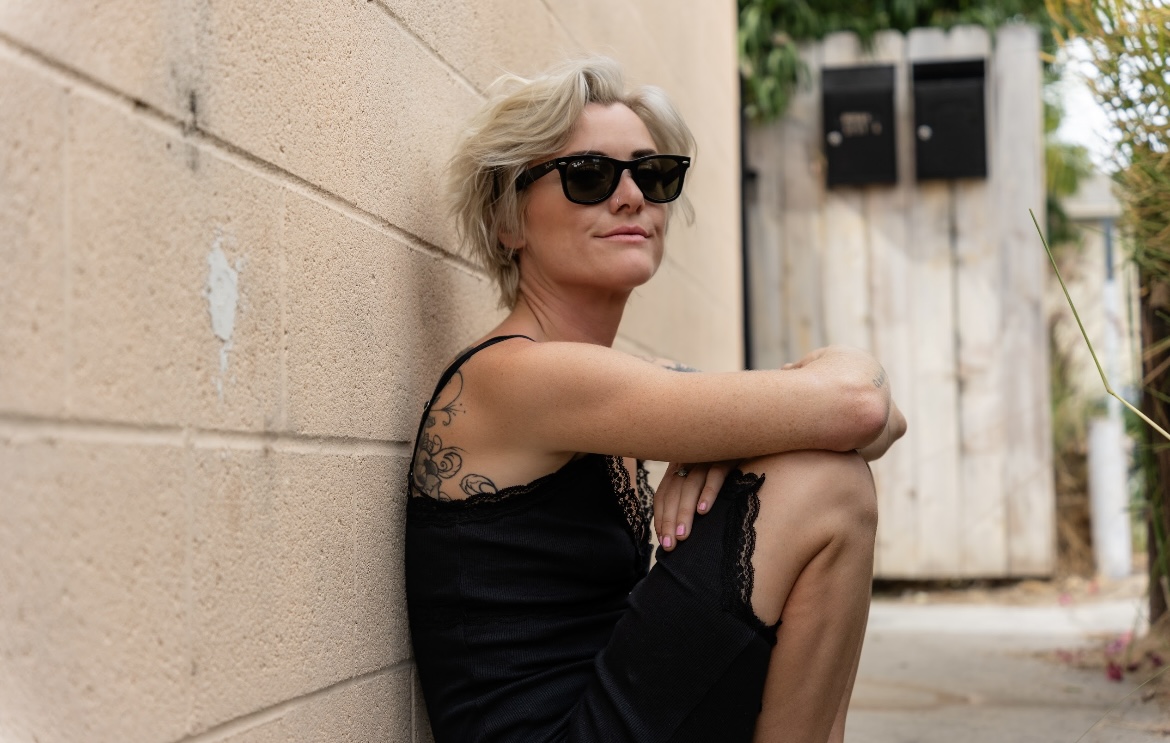
LONG BEACH, Calif. – Emerging from the dynamic music scene of Los Angeles, Juliet Hawkins seamlessly integrates deeply soulful vocals with contemporary production techniques, crafting a distinctive sound that defies conventional categorization.
Drawing inspiration from the emotive depth of Amy Winehouse and weaving together elements of country, blues, and pop, Hawkins’ music can best be described as a fusion–perhaps best termed as soulful electronica. Yet, even this characterization falls short, as Hawkins defines herself as “a blend of a million different inspirations.”
Hawkins’s musical palette mirrors her personae: versatile and eclectic. Any conversation with Hawkins makes this point abundantly clear. She exhibits the archetype of a wild, musical genius while remaining true to her nature-loving, creative spirit. Whether recording in the studio for an album release, performing live in a studio setting, or playing in front of a live audience, Hawkins delivers her music with natural grace.
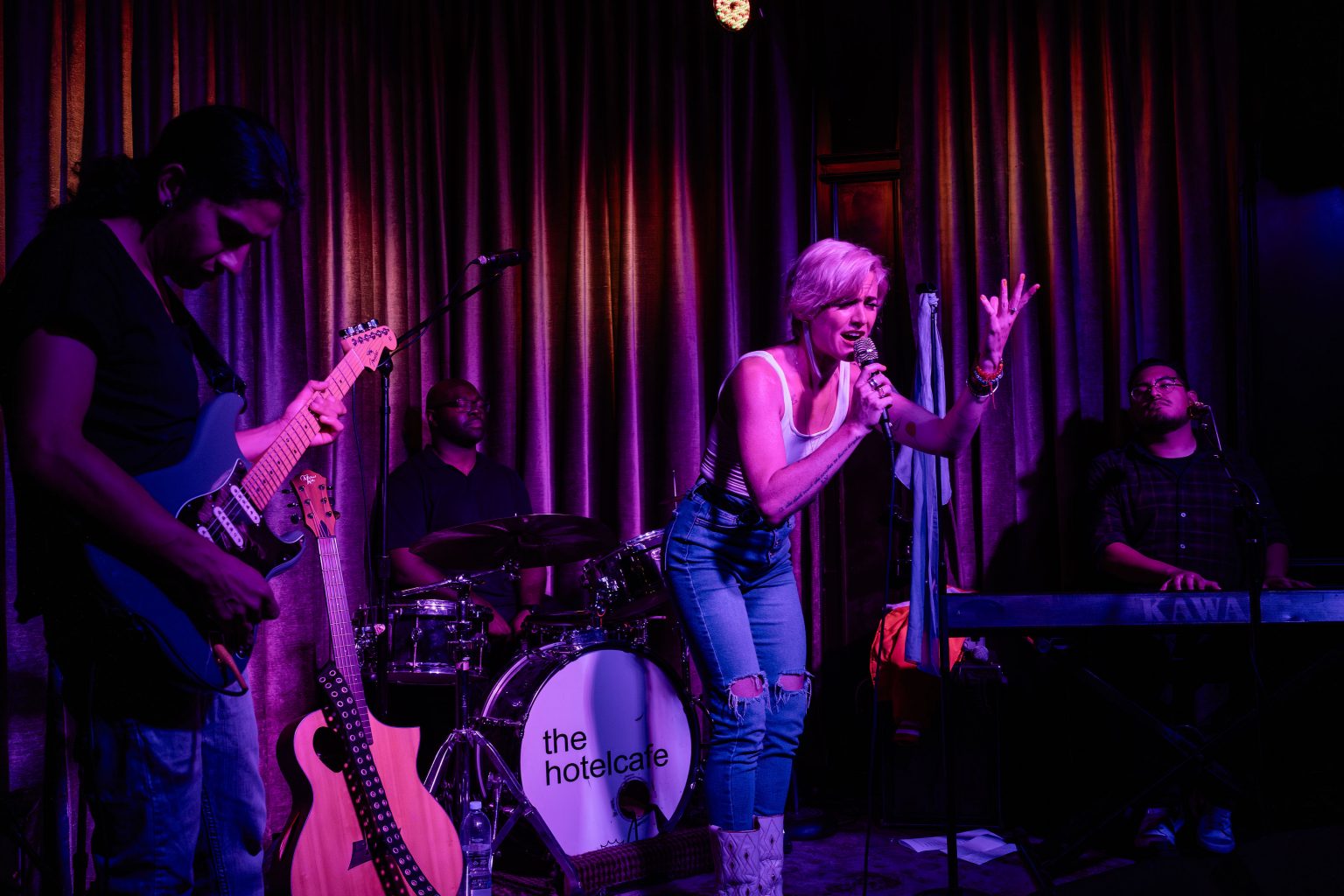
However, Hawkins’s musical journey is far from effortless. Amid personal challenges and adversity, she weaves her personal odyssey of pain and pleasure, transforming these experiences into empowering anthems.
In a candid interview with the Blade, Hawkins spoke with profound openness and vulnerability about her past struggles with opiate and heroin addiction: “That was 10 years ago that I struggled with opiates,” she shared. Yet, instead of letting her previous addiction define her, Hawkins expressed to the Blade that she harbors no shame about her past. “My newer music is much more about empowerment than recovery,” she explained, emphasizing that “writing was the best way to process trauma.”
Despite her struggles with addiction, Hawkins managed to recover. However, she emphasizes that this recovery is deeply intertwined with her spiritual connection to nature. An illustrative instance of Hawkins’ engagement with nature occurred during the COVID pandemic.
Following an impulse that many of us have entertained, she bought a van and chose to live amidst the trees. It was during this period that Hawkins composed the music for her second EP, titled “Lead with Love.”
In many ways, Hawkins deep spiritual connection to nature has been profoundly shaped by her extensive travels. Born in San Diego, spending her formative years in Massachusetts, and later moving to Tennessee before returning to Southern California, she has broadened her interests and exposed herself to the diverse musical landscapes across America.
“Music is the only thing I have left,” Hawkins confides to the Blade, highlighting the integral role that music has in her life. This intimate relationship with music is evident in her sultry and dynamic compositions. Rather than imitating or copying other artists, Hawkins effortlessly integrates sounds from some of her favorite musical influences to create something new. Some of these influences include LP, Lucinda Williams, Lana Del Rey, and, of course, Amy Winehouse, among others.
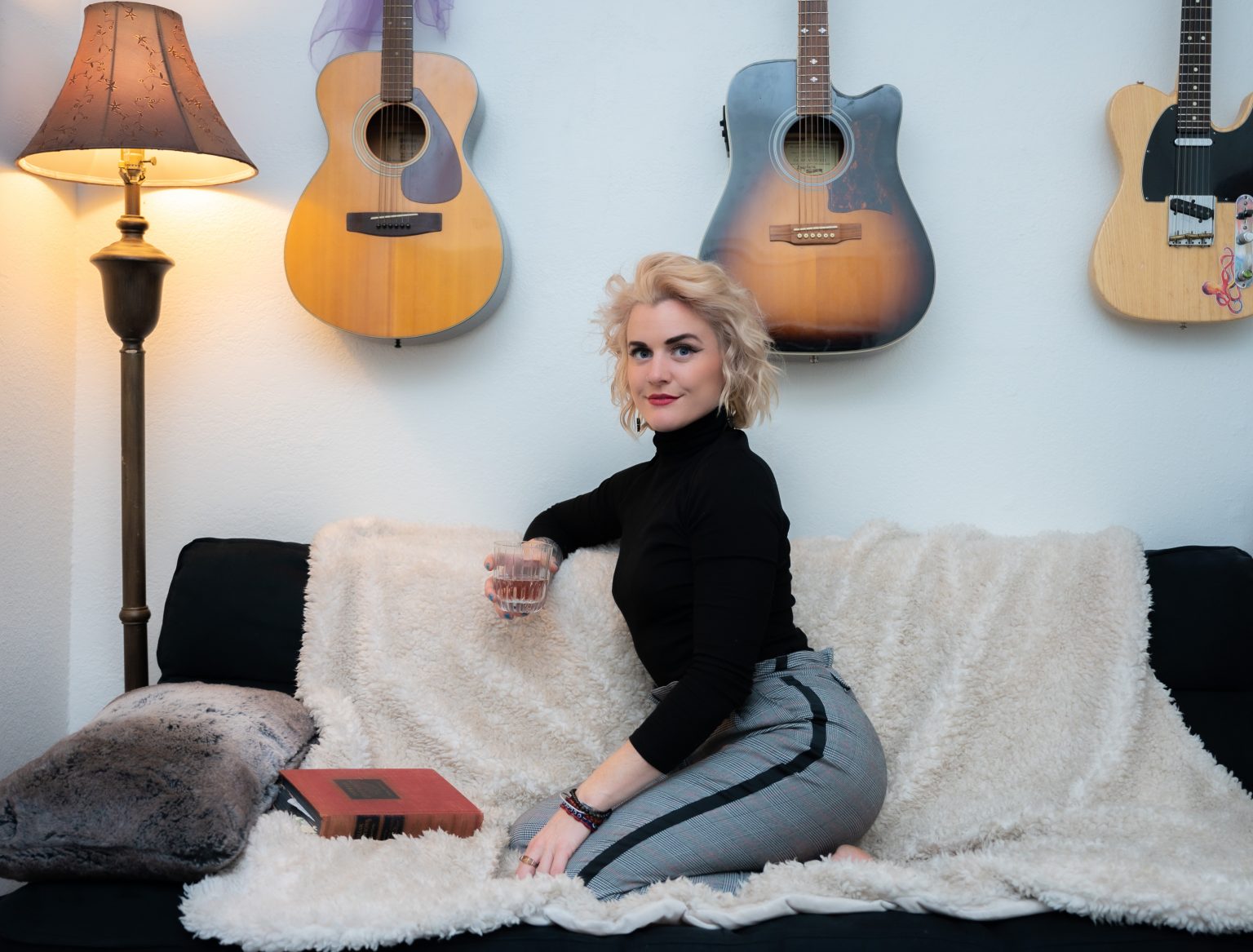
Hawkins has always been passionate about music—-she began with piano at a young age, progressed to guitar, and then to bass, eagerly exploring any instrument she could get her hands on. However, instead of following a traditional path of formalized lessons and structured music theory, Hawkins told the Blade that she “has a hard time following directions and being told what to do.”
This independent approach has led her to experiment with various genres and even join unexpected groups, such as a tribute band for Eric Clapton and Cream. While she acknowledges that her eclectic musical interests might be attributed to ADHD, she holds a different belief: “Creative minds like to move around.”
When discussing her latest musical release — “Stay True (the live album)” which was recorded in a live studio setting — Hawkins describes the experience as a form of improvisation with both herself and the band:
“[The experience] was this divine honey that was flowing through all of us.” She explains that this live album was uncertain in the music’s direction. “For a couple of songs,” Hawkins recalls, “we intuitively closed them out.” By embracing creative spontaneity and refusing to be constrained by fear of mistakes, the live album authentically captures raw sound, complete with background chatter, extended outros, and an extremely somber cover of Ozzy Osbourne’s “Crazy Train” coupled with a slow piano and accompanied strings.
While “Stay True” was a rewarding experience for Hawkins, her favorite live performance took place in an unexpected location—an unattended piano in the middle of an airport. As she began playing Beethoven’s “Moonlight Sonata”, Hawkins shared with the Blade a universal connection we all share with music: “This little girl was dancing as I was playing.”
After the performance, tears welled in Hawkins’ eyes as she was touched by the young girl’s appreciation of her musicianship. Hawkins tells the Blade, “It’s not about playing to an audience—it’s about finding your people.”
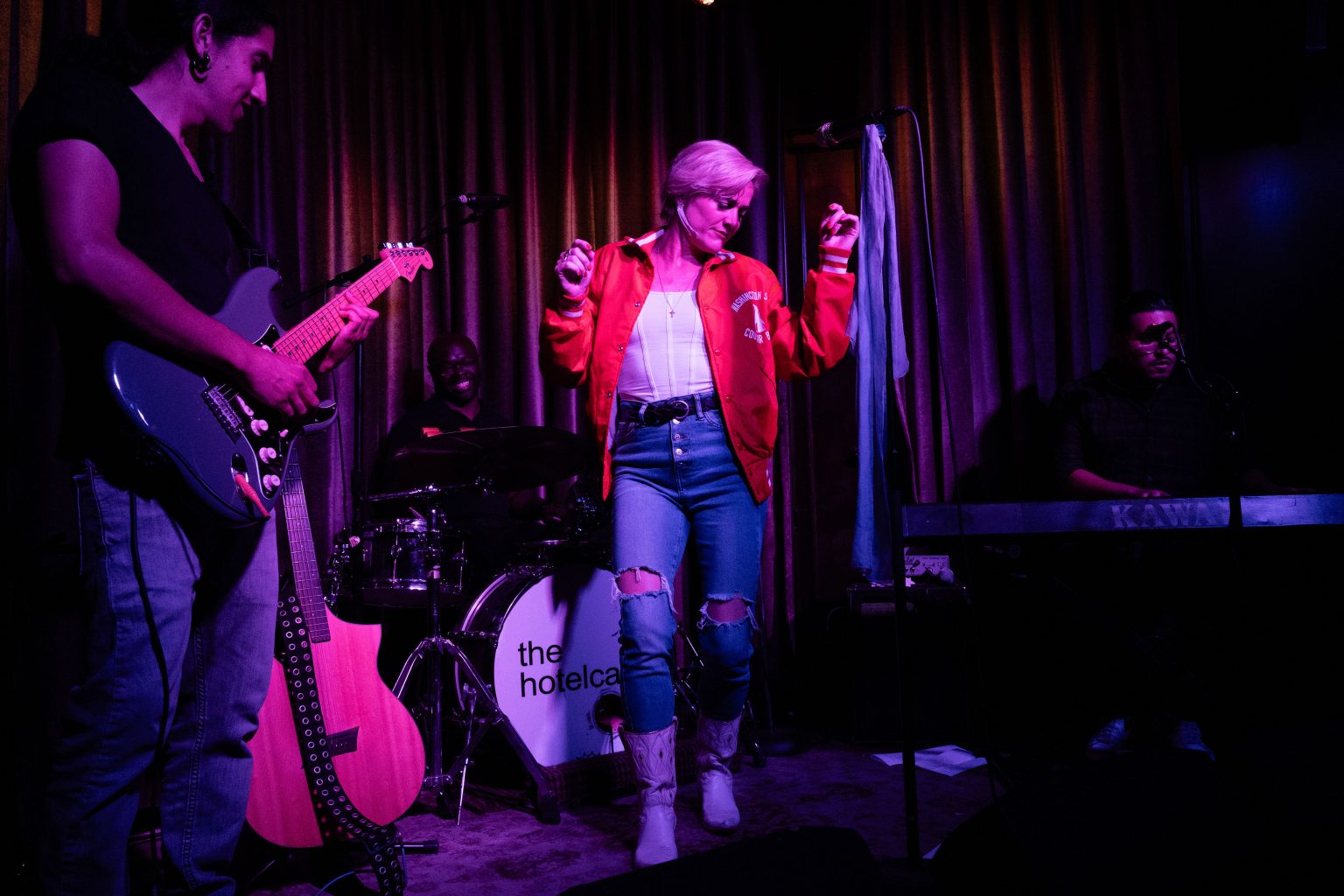
What sets Hawkins apart as an artist is her ability to connect with her audience in diverse settings. She highlights EDC, an electronic dance music festival, as a place where she unabashedly lets her “freak flag” fly and a place to connect with her people. Her affinity for electronic music not only fuels her original pop music creations, but also inspires her to reinterpret songs with an electronic twist. A prime example of this is with her electronic-style cover of Tal Bachman’s 90’s hit, “She’s So High.”
As an openly queer woman in the music industry, Hawkins is on a mission to safeguard artistic integrity. In songs like “My Father’s Men,” she bares her vulnerability and highlights the industry’s misogyny, which often marginalizes gender minorities in their pursuit of artistic expression.
She confides to the Blade, “The industry can be so sexist, misogynist, and oppressive,” and points out that “there are predators in the industry.” Yet, rather than succumbing to apathy, Hawkins is committed to advocating for gender minorities within the music industry.
“Luckily, people are rising up against misogyny, but it’s still there. ‘My Father’s Men’ is a message: It’s time for more people who aren’t just white straight men to have a say.”
Hawkins is also an activist for other causes, with a fervent belief in the preservation of bodily autonomy. Her self-directed music video “I’ll play Daddy,” showcases the joy of embracing one’s body with Hawkins being sensually touched by a plethora of hands. While the song, according to Hawkins, “fell upon deaf ears in the south,” it hasn’t stopped Hawkins from continuing to fight for the causes she believes in. In her interview, Hawkins encapsulated her political stance by quoting an artist she admires:
“To quote Pink, ‘I don’t care about your politics, I care about your kids.’”
When Hawkins isn’t writing music or being a champion for various causes, you might catch her doing the following: camping, rollerblading, painting, teaching music lessons, relaxing with Bernie (her beloved dog), stripping down for artsy photoshoots, or embarking on a quest to find the world’s best hollandaise sauce.
But at the end of the day, Hawkins sums up her main purpose: “To come together with like-minded people and create.”
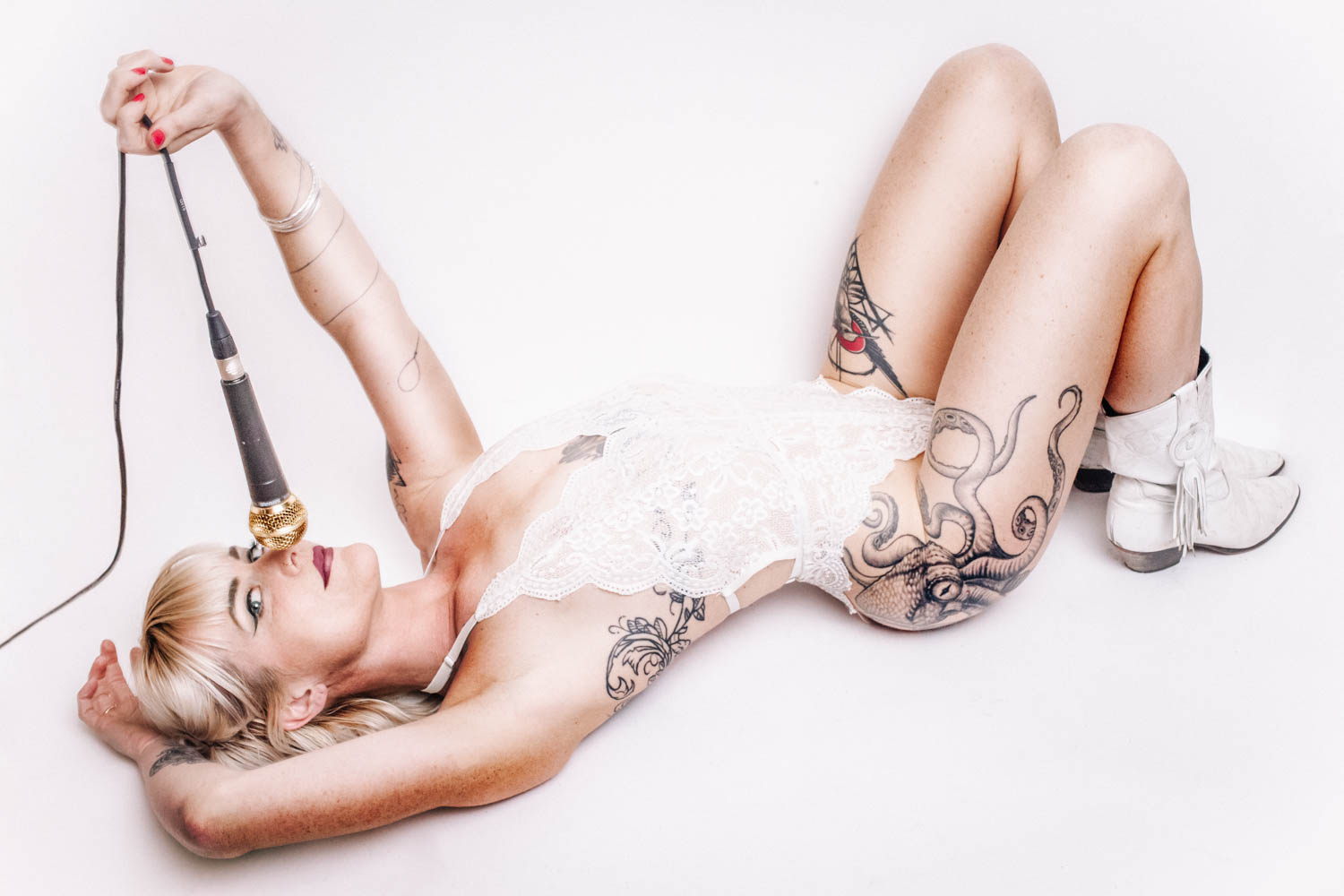
Part of this ever-evolving, coming-of-age-like journey includes an important element: plant-based medicine. Hawkins tells the Blade that she acknowledges her previous experience with addiction and finds certain plants to be useful in her recovery:
“The recovery thing is tricky,” Hawkins explains, “I don’t use opiates—-no powders and no pills—but I am a fan of weed, and I think psilocybin can be helpful when used at the right time.” She emphasizes the role of psychedelics in guiding her towards her purpose. “Thanks for psychedelics, I have a reignited sense of purpose … Music came naturally to me as an outlet to heal.”
While she views the occasional dabbling of psychedelics as a spiritual practice, Hawkins also embraces other rituals, particularly those she performs before and during live shows. “I always carry two rocks with me: a labradorite and a tiger’s eye marble,” she explains.
-

 State Department4 days ago
State Department4 days agoState Department releases annual human rights report
-

 District of Columbia3 days ago
District of Columbia3 days agoCatching up with the asexuals and aromantics of D.C.
-

 South America2 days ago
South America2 days agoArgentina government dismisses transgender public sector employees
-

 Maine4 days ago
Maine4 days agoMaine governor signs transgender, abortion sanctuary bill into law



